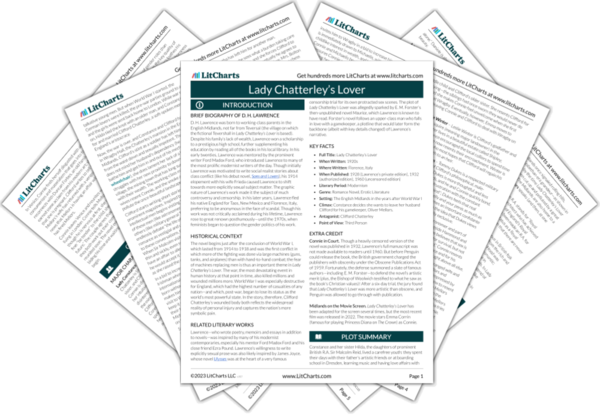Hilda Quotes in Lady Chatterley’s Lover
But a woman could yield to a man without yielding her inner, free self. That the poets and talkers about sex did not seem to have taken sufficiently into account. A woman could take a man without really giving herself away. Certainly she could take him without giving herself into his power. Rather she could use the sex thing to have power over him. For she only had to hold herself back in sexual intercourse, and let him finish and expend himself without herself coming to the crisis: and then she could prolong the connection and achieve her orgasm and her crisis while he was merely her tool.
And he stuck flowers in the hair of his own body, and wound a bit of creeping-jenny round his penis, and stuck a single bell of a hyacinth in his naval. She watched him with amusement, his odd intentness. And she pushed a campion flower in his mustache, where it stuck, dangling under his nose.
“This is John Thomas marryin’ Lady Jane,” he said. “And we mun let Constance an’ Oliver go their separate ways. Maybe—”
[…] “Maybe what? Go on with what you were going to say,” she insisted.
“Ay, what was I going to say?”
He had forgotten. And it was one of the great disappointments of her life, that he never finished.
“But you'll be through with him in a while,” [Hilda] said, “and then you'll be ashamed of having been connected with him. One can’t mix up with the working people.”
“But you were such a socialist! You're always on the side of the working classes.”
“I may be on their side in a political crisis, but being on their side makes me know how impossible it is to mix one's life with theirs. Not out of snobbery, but just because the whole rhythm is different.”
Hilda had lived among the real political intellectuals, so she was disastrously unanswerable.

Hilda Quotes in Lady Chatterley’s Lover
But a woman could yield to a man without yielding her inner, free self. That the poets and talkers about sex did not seem to have taken sufficiently into account. A woman could take a man without really giving herself away. Certainly she could take him without giving herself into his power. Rather she could use the sex thing to have power over him. For she only had to hold herself back in sexual intercourse, and let him finish and expend himself without herself coming to the crisis: and then she could prolong the connection and achieve her orgasm and her crisis while he was merely her tool.
And he stuck flowers in the hair of his own body, and wound a bit of creeping-jenny round his penis, and stuck a single bell of a hyacinth in his naval. She watched him with amusement, his odd intentness. And she pushed a campion flower in his mustache, where it stuck, dangling under his nose.
“This is John Thomas marryin’ Lady Jane,” he said. “And we mun let Constance an’ Oliver go their separate ways. Maybe—”
[…] “Maybe what? Go on with what you were going to say,” she insisted.
“Ay, what was I going to say?”
He had forgotten. And it was one of the great disappointments of her life, that he never finished.
“But you'll be through with him in a while,” [Hilda] said, “and then you'll be ashamed of having been connected with him. One can’t mix up with the working people.”
“But you were such a socialist! You're always on the side of the working classes.”
“I may be on their side in a political crisis, but being on their side makes me know how impossible it is to mix one's life with theirs. Not out of snobbery, but just because the whole rhythm is different.”
Hilda had lived among the real political intellectuals, so she was disastrously unanswerable.











